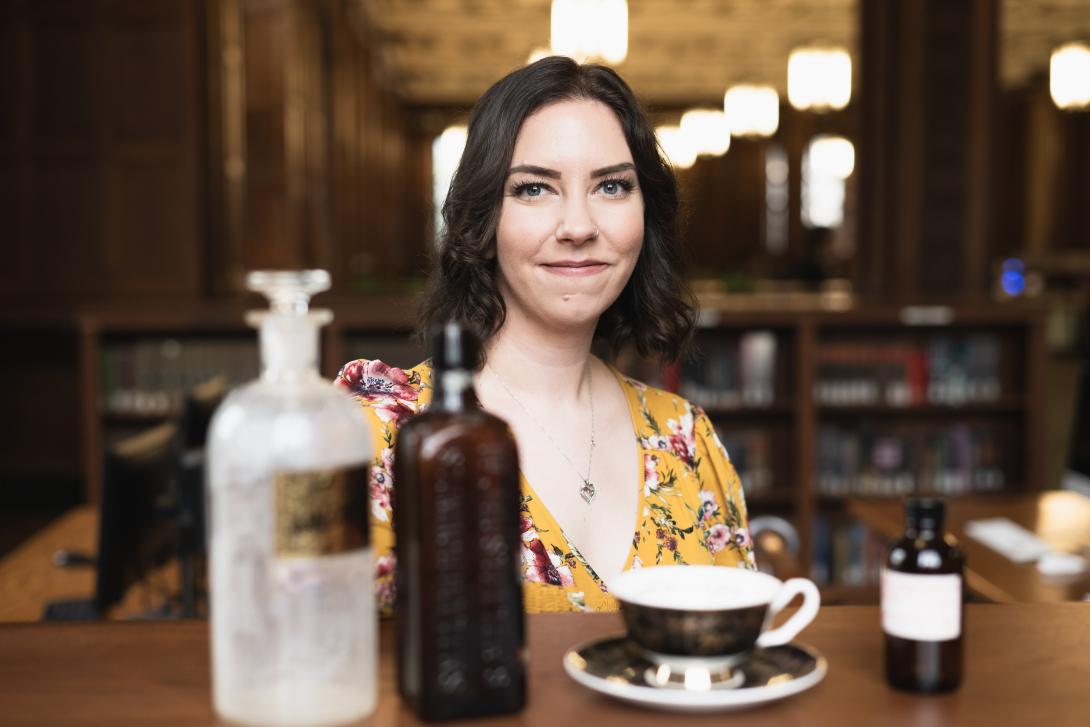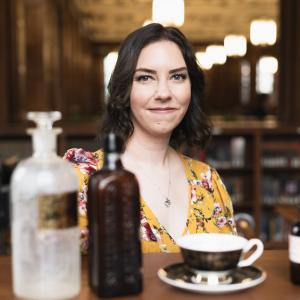
When Ashlee Simon studies literature of the Victorian period, she sees the history of medicine reflected on the pages of novels and in the stanzas of poems.
“So many health discoveries were made in that 100 years,” says Simon, a doctoral student in English. “You start with things like the stethoscope and germ theory and then you end with discoveries like ether, chloroform, and vaccinations and the like. It comes such a long way in such a quick time.”
Simon’s studies combine her interests in literature and the history of medicine, addiction and toxicology – an approach that fits well with Lehigh’s emphasis on interdisciplinary study. Since first coming to Lehigh for her master’s degree in English, her scholarship has included study and teaching in both the English Department in the College of Arts and Sciences and the Department of Community and Population Health in the College of Health.
She says her interest in literature and medicine began when she studied the Decadent Movement in literature of the late 19th century when she was an undergraduate at the University of California, Riverside. Simon, a California native, earned her bachelor’s degree in English there.
“Oscar Wilde was one of the major figures of that period, and we read a poem called ‘Symphony in Yellow,’” Simon recalls. “The poem itself doesn't outright discuss medicine, but the professor asked the class about what we connected to the color yellow and I associated it with jaundice, which led to a discussion of the popularity of absinthe at the time.”
Once sparked, her interest became a passion that led to her undergraduate honors capstone project on the history of absinthe, the powerful alcoholic drink with drug-like properties that was dubbed the Green Fairy. Her project explored its use and how it was perceived in literature of the period. When Simon arrived at Lehigh in 2018 as a master’s degree student she already knew that health humanities in the Victorian period would continue to be a focus.
Simon’s master’s degree thesis, “Speed and Stasis: Stimulants, Paralytics, and Narrative Velocity in The Sign of Four,” allowed her to examine drugs and toxicology in Sir Arthur Conan Doyle’s second novella, featuring legendary sleuth Sherlock Holmes. “I was really interested in how the substances present in that story impact the speed of the narrative delivery of the story itself,” Simon explains. She notes that early in the story, Holmes injects himself with cocaine, a known stimulant, and the narrative accelerates. At the time, cocaine was viewed as a wonder drug with the ability to improve numerous ailments. Later, one of the villains in the story employs curare, a poisonous plant extract that leads to paralysis, slowing the story until the pace accelerates again as Holmes solves the case.
Simon’s interest in tracing medicines, drugs and poisons as thematic elements in Victorian literature has led to her first publication, a chapter in an academic edited collection. Her piece “Scandalous Stupor: Chloroform and Robbery in Victorian Periodicals,” was published in 2022 in The Routledge Handbook of Victorian Scandals in Literature and Culture. Simon will explore a similar theme in her doctoral dissertation. Tentatively titled “Deadly Feminine: Women, Poison, and Domestic Spaces in the Victorian Age,” the dissertation will explore how female literary characters used poison to exert control within the home, and how those spaces and societal gender expectations were particularly toxic for women.
Elizabeth Dolan, Dean of the College of Health and professor of English, chaired Simon’s doctoral exam committee and is supervising her dissertation. “Her scholarship is highly original,’ Dolan says. “She's looking at documents that are in the popular culture, as well as literary documents. And by popular culture, obviously, I mean 19th-century popular culture. So she’s looking at things like advertisements or newspaper articles and really trying to understand how people are thinking culturally about poison, for example.”
She first became acquainted with Simon’s perspective when she took a graduate seminar Dolan taught in 2018 marking the 200th anniversary of Mary Shelley’s novel Frankenstein. “She wrote a really interesting paper in that class connecting the character Henry Clerval with the history of nursing,” Dolan says.
One of the reasons Simon originally chose Lehigh is because she is able to teach undergraduate classes while also receiving full-funding towards her degree. This was a win-win for Simon, who is interested in university teaching as a career. “I honestly think it's one of the best selling points of the program in terms of getting people interested in pursuing English graduate degrees at Lehigh,” states Simon, who has continued to teach as a doctoral student.
She has been able to explore her interests in literature and health humanities in her classroom. Like most English graduate students, she teaches sections of English 001, Critical Reading and Composition, and English 002, Research and Argument, both required classes for undergraduates. In Research and Argument classes, content centers on a special topic of the instructor’s choice – in Simon’s case, the history of drug development, from the introduction of anesthesia in the 1800s to the opioid crisis today. Simon also is a teaching assistant for the College of Health, with involvement in both Community and Global Health and Population Health courses.
Simon says the opportunity to teach across disciplines supports her long-term goal of teaching at a university. “I've been able to move between the English Department and the College of Health pretty seamlessly, which I think is amazing….and will serve me well as I aim to further my career. I’m very grateful.”
Dolan says Simon is a creative teacher who uses new technologies and new approaches in assignments, for example inviting students to create podcasts rather than write standard papers. “The students love her,” Dolan notes, adding that Simon is very supportive of them. “She's very aware that we're in a time across the United States, in which there’s a real increase in mental health challenges among students in college. She's incredibly kind and flexible around that for students. They know that she wants them to succeed,” Dolan says.
If Simon is supportive of students, it reflects the level of support she has received since coming to Lehigh. “I really couldn't have asked for a better experience,” she says, adding that Dolan and the other faculty comprising her doctoral exam committee, Lorenzo Servitje, associate professor of English and Health, Medicine and Society, and Michael Kramp, professor of English, have been especially helpful. “It’s just wonderful as a student knowing that every single faculty member in the English Department, especially those that I've worked so closely with, always have this desire to push me, but also support me and help me open doors and introduce me to people to network with.”
As she begins work on her dissertation, she is aware of parallels between medical issues of the past and current times. “I think what's wild to me in my study of literature is how cyclical everything is,” Simon says. “We're living through an opioid epidemic today that was born out of companies and medical professionals claiming that opioids weren't addictive. And this was very similar to what was happening in the Victorian period with things like laudanum and opium…. Not to mention the unsettling similarities in the stigmatized perception of substance use disorders. There are so many things that are happening in 2023 that have already happened in 1853, only in slightly different clothing.”
Spotlight Recipient

Ashlee Simon
Ph.D. candidate in English
